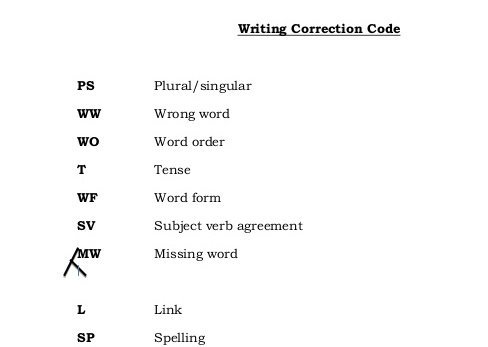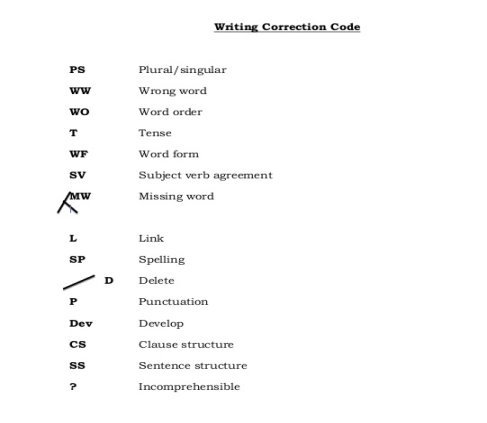In the article the author presents the effective way of the assessment of the students’ written assignments.
Key words: writing, writing correction code, 11 grade students
Introduction
Writing is the most challenging skill for the majority of students. When students write they should take into consideration several areas such as the correct use of grammar, cohesion, coherence, spelling, punctuation, layout, content and etc. Also students should follow the correct structure of an essay or an article. During my teaching practice and after an analysis of students’ writing assignments it has been revealed that writing skill is still the most difficult for a number of students. The majority of students struggle to produce a good piece of writing due to the incorrect use of grammar, vocabulary, sentence structure, layout and also because writing is “essentially a solitary activity…without the possibility of interaction or the benefit of feedback” Byrne, 1988 [1]. Therefore, in order to improve these particular areas it was decided to use a writing code and constructive feedback. According to Hattie and Timperely (2007) [2] the writing code will help students to avoid making the same mistakes, whereas constructive feedback will provide students with information about what should be done better regarding some aspects of the task performance.
The organization of aprocess
At the beginning of the school year the 11th grade students were divided into several groups and were asked to create a writing code. Then students presented their writing correction codes with explanation to the whole class. Finally, students came up to one writing correction code with some common mistakes, which will be used both by peers and by a teacher while assessing the writing assignments.

Fig. 1
This activity was done in order to get ideas from the students, activate their background knowledge and create an interest rather than providing them with a ready-made list of writing correction codes.
Also students were taught what constructive feedback is and how to provide their peers with the constructive feedback. The structure of feedback was the next: students start with something positive (for example, you used very interesting collocations in your essay and give an example of these collocations from the essay), then they focus on some areas to improve (for example, pay close attention to the correct use of the Present Simple Tense) and finally, students finish with something positive (for example, overall you did a good job). Also there should be offered some specific suggestions (for example, practice the use of the Present Simple Tense. It can be done by completing grammar exercises and then creating own sentences).
Before starting to apply the writing correction code and constructive feedback in assessing the whole essays, article or any other piece of writing, they had been practiced during each other lesson for about three weeks. Each lesson students wrote a short paragraph applying the learnt vocabulary or just expressing their opinion about a given question. Then students exchanged their written paragraphs with their peers. Students used the writing code and provided their partners with constructive feedback. However, while monitoring it was revealed that some students had problems with giving constructive feedback as they were mainly focused only on areas for improvement. Consequently, in order to assist students it was decided to recommend students to use a sticker, where students will organize their ideas (it was like a planning stage) by dividing it into two columns: good and areas to improve. Students wrote only bully points on these stickers and then by using these ideas, it was much easier for them to provide their peers with constructive feedback. In addition, some less able students struggled with using appropriate phrases and words in giving feedback. In order to help these students the brief writing assessment criteria was created, so that students will be able to take some ideas and phrases from it. Writing assessment criteria was not changed from lesson to lesson, but some ideas were added to the list, so that students will learn some useful phrases and will be more confident in giving their peers feedback without using any clues.
In terms of a writing correction code students did not have major problems. However, during the process it was discovered that some students make mistakes, which are not in the writing code list. Therefore, it was decided to expand this list by adding some other writing codes, which will cover these mistakes. As a result, a writing code was a little bit adjusted.

Fig. 2
After three weeks students were ready to write their final products and also it was the end of the unit, which also implied to apply all learnt material from the unit into practice. As Thornburry (2004) [3] claimed that writing is a process, which goes through several stages such as planning, drafting, editing and final product Therefore, the series of lessons were organized following these well-known stages. First, students were introduced with the structure of an essay, then they analysed an example essay so that they will have a clear idea about what is expected from them. Also students were given the writing assessment criteria to follow. The next step was planning students brainstormed their ideas and made a plan. Then they started writing their essays. The next stage was editing. During this stage students exchanged their essays and checked their partners’ work using a writing code and providing their peers with constructive feedback. After getting their papers back students started to correct their mistakes following the given feedback and a writing code. The last stage was to give essays to a teacher. I also checked their essays and at the same time I overlooked their peers’ feedback. If I agreed with this feedback, I highlighted these ideas and put smiles or wrote “Great idea! Or I agree with you”. Next lesson I gave their essays back and if a students had a number of mistakes, I asked them to rewrite an essay and give me back taking into consideration all areas for improvement. In order to make sure that students will not be reluctant to write the essay again, I clearly explained them that it will help them to improve, as without making mistakes and without correcting these mistakes it is difficult to develop.
Results
It order to see whether there is an improvement or not as the assessment of the essays during the term was more formative and students were given feedback so that it will help them to develop and also students had a chance to rewrite their papers, therefore it was decided to analyse students’ summative assessment results. Due to the fact that a regular teacher does not assess her/his students’ exam papers, but another teacher who teaches the same grade checks them within a department. Therefore, there was a golden opportunity to get more objective and valid results. According to the summative assessment results from the first and the second term it was seen that students’ essays improved especially their grammar and vocabulary. Some students still make mistakes, but these mistakes are more about inappropriacy rather than the incorrect use of grammar or a spelling mistake. Writing is still a skill to focus on as it has a lot of areas to study and develop, but at least together with students we made small steps towards the improvement.
References:
- Byrne D. Teaching writing skills. — Paperback, 1988
- Hattie J. and Timperely H. The power of feedback. –Research article, 2007
- Thornburry S. Natural grammar. — Paperback, 2004







